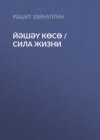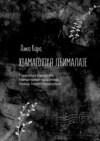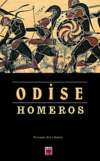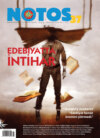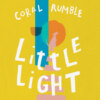Kitabı oku: «Pan Michael», sayfa 28
At last the cocks crowed, and she was still struggling with the fever. Toward morning a fierce rain-storm burst forth; it roared among the beams, howled on the roof; at times the flames quivered in the chimney, casting into the room puffs of smoke and sparks. About daylight Pan Motovidlo stepped out quietly, for he had to go on a reconnoissance. At last day came pale and cloudy, and lighted weary faces.
On the square the usual movement began. In the whistling of the storm were heard the tramp of horses on the planking of the stable, the squeak of the well-sweeps, and the voices of soldiers; but soon a bell sounded, – Father Kaminski had come.
When he entered, wearing his white surplice, the officers fell on their knees. It seemed to all that the solemn moment had come, after which death must follow undoubtedly. The sick woman had not regained consciousness; therefore the priest could not hear her confession. He only gave her extreme unction; then he began to console the little knight, and to persuade him to yield to the will of God. But there was no effect in that consolation, for no words could reach his pain.
For a whole day death hovered over Basia. Like a spider, which secreted in some gloomy corner of the ceiling crawls out at times to the light, and lets itself down on an unseen web, death seemed at times to come down right there over Basia's head; and more than once it seemed to those present that his shadow was falling on her forehead, that that bright soul was just opening its wings to fly away out of Hreptyoff, somewhere into endless space, to the other side of life. Then again death, like a spider, hid away under the ceiling, and hope filled their hearts.
But that was merely a partial and temporary hope, for no one dared to think that Basia would survive the attack. Pan Michael himself had no hope of her recovery; and this pain of his became so great that Zagloba, though suffering severely himself, began to be afraid, and to commend him to the care of the officers.
"For God's sake, look after him!" said the old man; "he may plunge a knife into his body."
This did not come, indeed, to Pan Michael's head; but in that rending sorrow and pain he asked himself continually, —
"How am I to stay behind when she goes? How can I let that dearest love go alone? What will she say when she looks around and does not find me near her?"
Thinking thus, he wished with all the powers of his soul to die with her; for as he could not imagine life for himself on earth without her, in like manner he did not understand that she could be happy in that life without him, and not yearn for him. In the afternoon the ill-omened spider hid again in the ceiling. The flush in Basia's cheeks was quenched, and the fever decreased to a degree that some consciousness came back to her.
She lay for a time with closed eyes, then, opening them, looked into the face of the little knight, and asked, —
"Michael, am I in Hreptyoff?"
"Yes, my love," answered Volodyovski, closing his teeth.
"And are you really near me?"
"Yes; how do you feel?"
"Ai, well."
It was clear that she herself was not certain that the fever had not brought before her eyes deceptive visions; but from that moment she regained consciousness more and more.
In the evening Lusnia and his men came and shook out of a bag before the fort the doctor of Kamenyets, together with his medicines; he was barely alive. But when he learned that he was not in robber hands, as he thought, but was brought in that fashion to a patient, after a passing faintness he went to the rescue at once, especially as Zagloba held before him in one hand a purse filled with coin, in the other a loaded pistol, and said, —
"Here is the fee for life, and there is the fee for death."
That same night, about daybreak, the spider of ill-omen hid away somewhere for good; thereupon the decision of the doctor, "She will be sick a long time, but she will recover," sounded with joyful echo through Hreptyoff. When Pan Michael heard it first, he fell on the floor and broke into such violent sobbing that it seemed as though his bosom would burst. Zagloba grew weak altogether from joy, so that his face was covered with sweat, and he was barely able to exclaim, "A drink!" The officers embraced one another.
On the square the dragoons assembled again, with the escort and the Cossacks of Pan Motovidlo; it was hardly possible to restrain them from shouting. They wanted absolutely to show their delight in some fashion, and they began to beg for a number of robbers imprisoned in the cellars of Hreptyoff, so as to hang them for the benefit of the lady.
But the little knight refused.
CHAPTER XLIII
Basia suffered so violently for a week yet, that had it not been for the assurance of the doctor both Pan Michael and Zagloba would have admitted that the flame of her life might expire at any moment. Only at the end of that time did she become notably better; her consciousness returned fully, and though the doctor foresaw that she would lie in bed a month, or a month and a half, still it was certain that she would return to perfect health, and gain her former strength.
Pan Michael during her illness went hardly one step from her pillow; he loved her after these perils still more, if possible, and did not see the world beyond her. At times when he sat near her, when he looked on that face, still thin and emaciated but joyous, and those eyes, into which the old fire was returning each day, he was beset by the wish to laugh, to cry, and to shout from delight: —
"My only Basia is recovering; she is recovering!"
And he rushed at her hands, and sometimes he kissed those poor little feet which had waded so valiantly through the deep snows to Hreptyoff; in a word, he loved her and honored her beyond estimation. He felt wonderfully indebted to Providence, and on a certain time he said in presence of Zagloba and the officers: —
"I am a poor man, but even were I to work off my arms to the elbows, I will find money for a little church, even a wooden one. And as often as they ring the bells in it, I will remember the mercy of God, and the soul will be melting within me from gratitude."
"God grant us first to pass through this Turkish war with success," said Zagloba.
"The Lord knows best what pleases Him most," replied the little knight: "if He wishes for a church He will preserve me; and if He prefers my blood, I shall not spare it, as God is dear to me."
Basia with health regained her humor. Two weeks later she gave command to open the door of her chamber a little one evening; and when the officers had assembled in the room, she called out with her silvery voice: —
"Good-evening, gentlemen! I shall not die this time, aha!"
"Thanks to the Most High God!" answered the officers, in chorus.
"Glory be to God, dear child!" exclaimed Pan Motovidlo, who loved Basia particularly with a fatherly affection, and who in moments of great emotion spoke always in Russian.28
"See, gentlemen," continued Basia, "what has happened! Who could have hoped for this? Lucky that it ended so."
"God watched over innocence," called the chorus again through the door.
"But Pan Zagloba laughed at me more than once, because I have more love for the sabre than the distaff. Well, a distaff or a needle would have helped me greatly! But didn't I act like a cavalier, didn't I?"
"An angel could not have done better!"
Zagloba interrupted the conversation by closing the door of the chamber, for he feared too much excitement for Basia. But she was angry as a cat at the old man, for she had a wish for further conversation, and especially to hear more praises of her bravery and valor. When danger had passed, and was merely a reminiscence, she was very proud of her action against Azya, and demanded praise absolutely. More than once she turned to the little knight, and pushing his breast with her finger said, with the mien of a spoiled child, —
"Praise for the bravery!"
And he, the obedient, praised her and fondled her, and kissed her on the eyes and on the hands, till Zagloba, though he was greatly affected himself in reality, pretended to be scandalized, and muttered, —
"Ah, everything will be as lax as grandfather's whip."
The general rejoicing in Hreptyoff over Basia's recovery was troubled only by the remembrance of the injury which Azya's treason had wrought in the Commonwealth, and the terrible fate of old Pan Novoveski, of Pani and Panna Boski, and of Eva. Basia was troubled no little by this, and with her every one; for the events at Rashkoff were known in detail, not only in Hreptyoff, but in Kamenyets and farther on. A few days before, Pan Myslishevski had stopped in Hreptyoff; notwithstanding the treason of Azya, Krychinski, and Adurovich, he did not lose hope of attracting to the Polish side the other captains. After Pan Myslishevski came Pan Bogush, and later, news directly from Mohiloff, Yampol, and Rashkoff itself.
In Mohiloff, Pan Gorzenski, evidently a better soldier than orator, did not let himself be deceived. Intercepting Azya's orders to the Tartars whom he left behind, Pan Gorzenski fell upon them, with a handful of Mazovian infantry, and cut them down or took them prisoners; besides, he sent a warning to Yampol, through which that place was saved. The troops returned soon after. So Rashkoff was the only victim. Pan Michael received a letter from Pan Byaloglovski himself, giving a report of events there and other affairs relating to the whole Commonwealth.
"It is well that I returned," wrote Pan Byaloglovski, among other things, "for Novoveski, my second, is not in a state now to do duty. He is more like a skeleton than a man, and we shall be sure to lose a great cavalier, for suffering has crushed him beyond the measure of his strength. His father is slain; his sister, in the last degree of shame, given to Adurovich by Azya, who took Panna Boski for himself. Nothing can be done for them, even should there be success in rescuing them from captivity. We know this from a Tartar who sprained his shoulder in crossing the river; taken prisoner by our men, he was put on the fire, and divulged everything. Azya, Krychinski, and Adurovich have gone to Adrianople. Novoveski is struggling to follow without fail, saying that he must take Azya, even from the centre of the Sultan's camp, and have vengeance. He was always obstinate and daring, and there is no reason now to wonder at him, since it is a question of Panna Boski, whose evil fate we all bewail with tears, for she was a sweet maiden, and I do not know the man whose heart she did not win. But I restrain Novoveski, and tell him that Azya himself will come to him; for war is certain, and this also, that the hordes will move in the vanguard. We have news from Moldavia from the perkulabs, and from Turkish merchants as well, that troops are assembling already near Adrianople, – a great many of the horde. The Turkish cavalry, which they call 'spahis,' are mustering too; and the Sultan himself is to come with the janissaries. My benefactor, there will be untold myriads of them; for the whole Orient is in movement, and we have only a handful of troops. Our whole hope is in the rock of Kamenyets, which, God grant, is provisioned properly. In Adrianople it is spring; and with us almost spring, for tremendous rains are falling and grass is appearing. I am going to Yampol; for Rashkoff is only a heap of ashes, and there is no place to incline one's head, or anything to put into the mouth. Besides, I think that we shall be withdrawn from all the forts."
The little knight had information of equal and even greater certainty, since it came from Hotin. He had sent it too a short time before to the hetman. Still, Byaloglovski's letter, coming from the remotest boundary, made a powerful impression on him, precisely because it confirmed that intelligence. But the little knight had no fears touching war, his fears were for Basia.
"The order of the hetman to withdraw the garrisons may come any day," said he to Zagloba; "and service is service. It will be necessary to move without delay; but Basia is in bed yet, and the weather is bad."
"If ten orders were to come," said Zagloba, "Basia is the main question; we will stay here until she recovers completely. Besides, the war will not begin before the end of the thaws, much less before the end of winter, especially as they will bring heavy artillery against Kamenyets."
"That old volunteer is always sitting within you," replied the little knight, with impatience; "you think an order may be delayed for private matters."
"Well, if an order is dearer to you than Basia, pack her into a wagon and march. I know, I know, you are ready at command to put her in with forks, if it appears that she is unable to sit in the wagon with her own strength. May the hangman take you with such discipline! In old times a man did what he could, and what he couldn't he didn't do. You have kindness on your lips, but just let them cry, 'Haida on the Turk!' then you'll spit out your kindness as you would a peachstone, and you will take that unfortunate woman on horseback with a lariat."
"I without pity for Basia! Fear the wounds of the Crucified!" cried the little knight.
Zagloba puffed angrily for a time, then looking at the suffering face of Pan Michael, he said, —
"Michael, you know that I say what I say out of love really parental for Basia. Otherwise would I be sitting here under the Turkish axe, instead of enjoying leisure in a safe place, which at my years no man could take ill of me? But who got Basia for you? If it shall be seen that it was not I, then command me to drink a vat of water without a thing to give taste to it."
"I could not repay you in a lifetime for Basia!" cried the little knight.
Then they took each other by the shoulders, and the best harmony began between them.
"I have planned," said the little knight, "that when war comes, you will take Basia to Pan Yan's place. Chambuls do not go that far."
"I will do so for you, though it would delight me to go against the Turk; for nothing disgusts me like that swinish nation which does not drink wine."
"I fear only one thing: Basia will try to be at Kamenyets, so as to be near me. My skin creeps at thought of this; but as God is God she will try."
"Do not let her try. Has little evil come already, because you indulge her in everything, and let her go on that expedition to Rashkoff, though I cried out against it immediately?"
"But that is not true! You said that you would not advise."
"When I say that I will not advise a thing, that is worse than if I had spoken against it."
"Basia ought to be wise now, but she will not. When she sees the sword over my head she will resist."
"Do not let her resist, I repeat. For God's sake, what sort of a straw husband are you?"
"I confess that when she puts her fists in her eyes and begins to cry, or just let her pretend to cry, the heart in me is like butter on a frying-pan. It must be that she has given me some herb. As to sending her, I will send her, for her safety is dearer to me than my own life; but when I think that I must torture her so the breath stops in me from pity."
"Michael, have God in your heart! Don't be led by the nose!"
"Bah! don't be led yourself. Who, if not you, said that I have no pity for her?"
"What's that?" asked Zagloba.
"You do not lack ingenuity, but now you are scratching behind your ear yourself."
"Because I'm thinking what better argument to use."
"But if she puts her fists in her eyes at once?"
"She will, as God is dear to me!" said Zagloba, with evident alarm.
And they were perplexed, for, to tell the truth, Basia had measured both perfectly. They had petted her to the last degree in her sickness, and loved her so much that the necessity of opposing her wish and desire filled them with fear. That Basia would not resist, and would yield with submission to the decree, both knew well; but not to mention Pan Michael, it would have been pleasanter for Zagloba to rush himself the third man on a whole regiment of janissaries, than to see her putting her little fists into her eyes.
CHAPTER XLIV
On that same day there came to them aid infallible, as they thought, in the persons of guests unexpected and dear above all. The Ketlings came toward evening, without any previous intimation. The delight and astonishment at seeing them in Hreptyoff was indescribable; and they, learning on the first inquiry that Basia was returning to health, were comforted in an equal degree. Krysia rushed at once to the bedroom, and at the same moment exclamations and cries from there announced Basia's happiness to the little knight.
Ketling and Pan Michael embraced each other a long time; now they put each other out at arm's length, now they embraced again.
"For God's sake!" said the little knight. "I should be less pleased to receive the baton than to see you; but what are you doing in these parts?"
"The hetman has made me commander of the artillery at Kamenyets," said Ketling; "therefore I went with my wife to that place. Hearing there of the trials that had met you, I set out without delay for Hreptyoff. Praise be to God, Michael, that all has ended well! We travelled in great suffering and uncertainty, for we knew not whether we were coming here to rejoice or to mourn."
"To rejoice, to rejoice!" broke in Zagloba.
"How did it happen?" asked Ketling.
The little knight and Zagloba vied with each other in narrating; and Ketling listened, raising his eyes and his hands to heaven in wonderment at Basia's bravery.
When they had talked all they wished, the little knight fell to inquiring of Ketling what had happened to him, and he made a report in detail. After their marriage they had lived on the boundary of Courland; they were so happy with each other that it could not be better in heaven. Ketling in taking Krysia knew perfectly that he was taking "a being above earth," and he had not changed his opinion so far.
Zagloba and Pan Michael, remembering by this expression the former Ketling who expressed himself always in a courtly and elevated style, began to embrace him again; and when all three had satisfied their friendship, the old noble asked, —
"Has there come to that being above earth any earthly case which kicks with its feet and looks for teeth in its mouth with its finger?"
"God gave us a son," said Ketling; "and now again – "
"I have noticed," interrupted Zagloba. "But here everything is on the old footing."
Then he fixed his seeing eye on the little knight, whose mustaches quivered repeatedly.
Further conversation was interrupted by the coming of Krysia, who pointed to the door and said, —
"Basia invites you."
All went to the chamber together, and there new greetings began. Ketling kissed Basia's hand, and Pan Michael kissed Krysia's again; then all looked at one another with curiosity, as people do who have not met for a long time.
Ketling had changed in almost nothing, except that he had his hair cut closely, and that made him seem younger; but Krysia had changed greatly, at least considering the time. She was not so slender and willowy as before, and her face was paler, for which reason the down on her lip seemed darker; but she had the former beautiful eyes with unusually long lashes, and the former calmness of countenance. Her features, once so wonderful, had lost, however, their previous delicacy. The loss might be, it is true, only temporary; still, Pan Michael, looking at her and comparing her with his Basia, could not but think, —
"For God's sake, how could I fall in love with her when both were together? Where were my eyes?"
On the other hand, Basia seemed beautiful to Ketling; for she was really beautiful, with her golden, wayward forelock dropping toward her brows, with her complexion which, losing some of its ruddiness, had become after her illness like the leaf of a white rose. But now her face was enlivened somewhat by delight, and her delicate nostrils moved quickly. She seemed as youthful as if she had not yet reached maturity; and at the first glance it might be thought that she was some ten years younger than Ketling's wife. But her beauty acted on the sensitive Ketling only in this way, that he began to think with more tenderness of his wife, for he felt guilty with regard to her.
Both women related to each other all that could be told in a short space of time; and the whole company, sitting around Basia's bed, began to recall former days. But that conversation did not move somehow, for there were in those former days delicate subjects, – the confidences of Pan Michael with Krysia; and the indifference of the little knight for Basia, loved later, and various promises and various despairs. Life in Ketling's house had a charm for all, and left an agreeable memory behind; but to speak of it was awkward.
Ketling changed the subject soon after: —
"I have not told you yet that on the road we stopped with Pan Yan, who would not let us go for two weeks, and entertained us so that in heaven it could not be better."
"By the dear God, how are they?" cried Zagloba. "Then you found them at home?"
"We did; for Pan Yan had returned for a time from the hetman's with his three elder sons, who serve in the cavalry."
"I have not seen Pan Yan nor his family since the time of your wedding," said the little knight. "He was here in the Wilderness, and his sons were with him; but I did not happen to meet them."
"They are all very anxious to see you," said Ketling, turning to Zagloba.
"And I to see them," replied the old man. "But this is how it is: if I am here, I am sad without them; if I go there, I shall be sad without this weasel. Such is human life; if the wind doesn't blow into one ear it will into the other. But it is worse for the lone man, for if I had children I should not be loving a stranger."
"You would not love your own children more than us," said Basia.
When he heard this Zagloba was greatly delighted, and casting off sad thoughts, he fell at once into jovial humor; when he had puffed somewhat he said, —
"Ha, I was a fool there at Ketling's; I got Krysia and Basia for you two, and I did not think of myself. There was still time then."
Here he turned to the women, —
"Confess that you would have fallen in love with me, both of you, and either one would have preferred me to Michael or Ketling."
"Of course we should!" exclaimed Basia.
"Helena, Pan Yan's wife, too in her day would have preferred me. Ha! it might have been. I should then have a sedate woman, none of your tramps, knocking teeth out of Tartars. But is she well?"
"She is well, but a little anxious, for their two middle boys ran away to the army from school at Lukoff," said Ketling. "Pan Yan himself is glad that there is such mettle in the boys; but a mother is a mother almost always."
"Have they many children?" inquired Basia, with a sigh.
"Twelve boys, and now the fair sex has begun," answered Ketling.
"Ha!" cried Zagloba, "the special blessing of God is on that house. I have reared them all at my own breast, like a pelican. I must pull the ears of those middle boys, for if they had to run away why didn't they come here to Michael? But wait, it must be Michael and Yasek who ran away. There was such a flock of them that their own father confounded their names; and you couldn't see a crow for three miles around, for the rogues had killed every crow with their muskets. Bah, bah! you would have to look through the world for another such woman. 'Halska,' I used to say to her, 'the boys are getting too big for me, I must have new sport.' Then she would, as it were, frown at me; but the time came as if written down. Imagine to yourself, it went so far that if any woman in the country about could not get consolation, she borrowed a dress from Halska; and it helped her, as God is dear to me, it did."
All wondered greatly, and a moment of silence followed; then the voice of the little knight was heard on a sudden, —
"Basia, do you hear?"
"Michael, will you be quiet?" answered Basia.
But Michael would not be quiet, for various cunning thoughts were coming to his head. It seemed to him above all that with that affair another equally important might be accomplished; hence he began to talk, as it were to himself, carelessly, as about the commonest thing in the world, —
"As God lives, it would be well to visit Pan Yan and his wife; but he will not be at home now, for he is going to the hetman; but she has sense, and is not accustomed to tempt the Lord God, therefore she will stay at home."
Here he turned to Krysia. "The spring is coming, and the weather will be fine. Now it is too early for Basia, but a little later I might not be opposed, for it is a friendly obligation. Pan Zagloba would take you both there; in the fall, when all would be quiet, I would go after you."
"That is a splendid idea," exclaimed Zagloba; "I must go anyhow, for I have fed them with ingratitude. Indeed, I have forgotten that they are in the world, until I am ashamed."
"What do you say to this?" inquired Pan Michael, looking carefully into Krysia's eyes.
But she answered most unexpectedly, with her usual calmness, —
"I should be glad, but I cannot; for I will remain with my husband in Kamenyets, and will not leave him for any cause."
"In God's name, what do I hear?" cried Pan Michael. "You will remain in the fortress, which will be invested surely, and that by an enemy knowing no moderation? I should not talk if the war were with some civilized enemy, but this is an affair with barbarians. But do you know what a captured city means, – what Turkish or Tartar captivity is? I do not believe my ears!"
"Still, it cannot be otherwise," replied Krysia.
"Ketling," cried the little knight, in despair, "is this the way you let yourself be mastered? O man, have God in your heart!"
"We deliberated long," answered Ketling, "and this was the end of it."
"And our son is in Kamenyets, under the care of a lady, a relative of mine. Is it certain that Kamenyets must be captured?" Here Krysia raised her calm eyes: "God is mightier than the Turk, – He will not betray our confidence; and because I have sworn to my husband not to leave him till death, my place is with him."
The little knight was terribly confused, for from Krysia he had expected something different altogether.
Basia, who from the very beginning of the conversation saw whither Michael was tending, laughed cunningly. She fixed her quick eyes on him, and said, —
"Michael, do you hear?"
"Basia, be quiet!" exclaimed the little knight, in the greatest embarrassment. Then he began to cast despairing glances at Zagloba, as if expecting salvation from him; but that traitor rose suddenly, and said, —
"We must think of refreshment, for it is not by word alone that man liveth." And he went out of the chamber.
Pan Michael followed quickly, and stopped him.
"Well, and what now?" asked Zagloba.
"Well, and what?"
"But may the bullets strike that Ketling woman! For God's sake, how is this Commonwealth not to perish when women are managing it?"
"Cannot you think out something?"
"Since you fear your wife, what can I think out for you? Get the blacksmith to shoe you, – that's what!"



